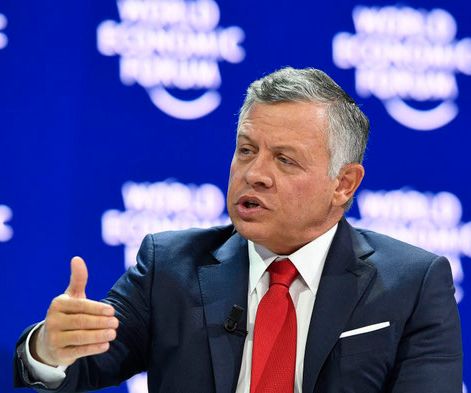 It is palpable that a nation’s foreign policy mirrors its political leaders’ perspectives and views. These are a product of internal and external factors that influence political orientations in relations with other countries and international organizations.
It is palpable that a nation’s foreign policy mirrors its political leaders’ perspectives and views. These are a product of internal and external factors that influence political orientations in relations with other countries and international organizations.
Jordan, like other Mideast countries, has always been inclined to its geopolitical environment, international relations, and causes and effects of its geographical, demographic and economic situations which include among others national wealth, foreign aid and socio-economic changes.
Among the major challenges that have been facing Jordan are the Zionist projects and their risk on the Palestinian-Israeli conflict as well as on Jordan. Jordan's foreign policy depends on its geography and geostrategic location. It also depends on the positions of major powers and axes. This confirms Jordan's continued need to balance its foreign relations network with the aim of achieving its political stability in line with its leadership strategy.
Since his assumption of constitutional powers, King Abdullah II has been striving to strengthen Jordan’s political and economic relations with other countries. Jordan, too, has a geographical location located between strong Arab forces: Saudi Arabia in the south, Iraq in the east and Syria in the north, and these countries are of great importance. Its adjacency to Palestine is also critical and is one of the challenges to the countries national security.
Determinants of Jordanian foreign policies:
Jordan has a high percentage of educated citizens. Since many of them work overseas and in other countries of the region, this affects the decision making process in the kingdom. Any decision would affect the Jordanian labor force in other countries due to kingdom’s stances vis-à-vis certain issues and causes including the recent developments in the question of Jerusalem when American President Donald Trump recognised Jerusalem as capital of Israel. In other words, Jordan balances out its policies to ease tension that would affect its human resources in other countries.
Moreover, the structure of Jordan’s population has a significant impact on Jordan's foreign policy. Since Jordan is scarce with its economic resources, it depends on assistance from foreign countries. That limits and restricts decision-making in the country and poses a major challenge on its leadership. The religious ideology of the Jordanian leadership and its doctrine regarding the Christian and Muslim Holy Sites in Jerusalem have given Jordan an important weight in the region. This justifies why King Abdullah denounced Trump’s decision regarding Jerusalem.
Though there is a growing polarization in the Arab arena, Jordan is watching attentively to set its own directions.
– Shehab Al-Makahleh
Though Jordan cannot do much about the American decision, the kingdom orchestrates to clarify the Jordanian stand regarding the holy sites in Jerusalem.
This is clear when the king said on Thursday at the World Economic Forum (WEF) in Davos: “Jerusalem is a city that ends up dividing us, which I think will be catastrophic for mankind, or is it a city of hope that brings us together.”
The king voiced Jordan’s support for resolving the status quo of the Palestinian-Israeli conflict. Some analysts believe that Jordan's foreign policy recently shifted from the role of competition with other regional countries to seeking national interests while moving with a quick dynamic to keep up with world changes. The political equation is that Jordan is fighting in order to preserve its survival and existence. It does not replace its old allies with new ones; it balances out its policies. The kingdom is striving to secure economic and water supplies necessary for the country’s progress and development.
Symbol of moderation
The king’s speeches in the US Congress, in the European Union as well as the United Nations, have always depicted a moderate Jordan, based on understanding of international and regional variables. The king, who leads the Jordanian foreign policy, links the history of Jordan with the modernity of the country that shape its identity when he speaks with other world leaders. This is how he promotes opportunities in the country at the international level. He usually interacts with Western decision-making circles. Many people wonder about the frequent visits of His Majesty to Washington and London. The reason is that further clarification leads to more communication and cooperation.
Jordanians believe that the Hashemite family is the true wealth of Jordan. Though there is a growing polarization in the Arab arena, Jordan is watching attentively to set its directions. This justifies why the king said in Davos that there is a need to reserve judgement on the future of the two-state solution until the United States presents its proposed peace deal.
To conclude, Jordan, globally and regionally, is viewed as a symbol of moderation. The kingdom is the most committed state to international obligations and a very good example of inter-cooperation. The Middle East has been, until this moment, a zone of influence for the great powers. In Jordan, when talking about politics, the focus is on the character of the king who formulates this policy and decision making. Furthermore, Jordanian foreign policy is governed by a combination of internal and external factors that interact with each other. Thus, Jordan is governed by a set of objectives. First, maintaining stability for the country is a priority. Second, the balance of policies with other Arab states to be able to respond to every change, movement or transformation. Third, respect for the sovereignty of all states in the world, the inadmissibility of interfering in internal affairs, and also full compliance to all treaties and conventions.
Article published in Al Arabiya: https://english.alarabiya.net/en/views/news/middle-east/2018/01/28/Jordan-s-foreign-policy-message-from-Davos-.html












